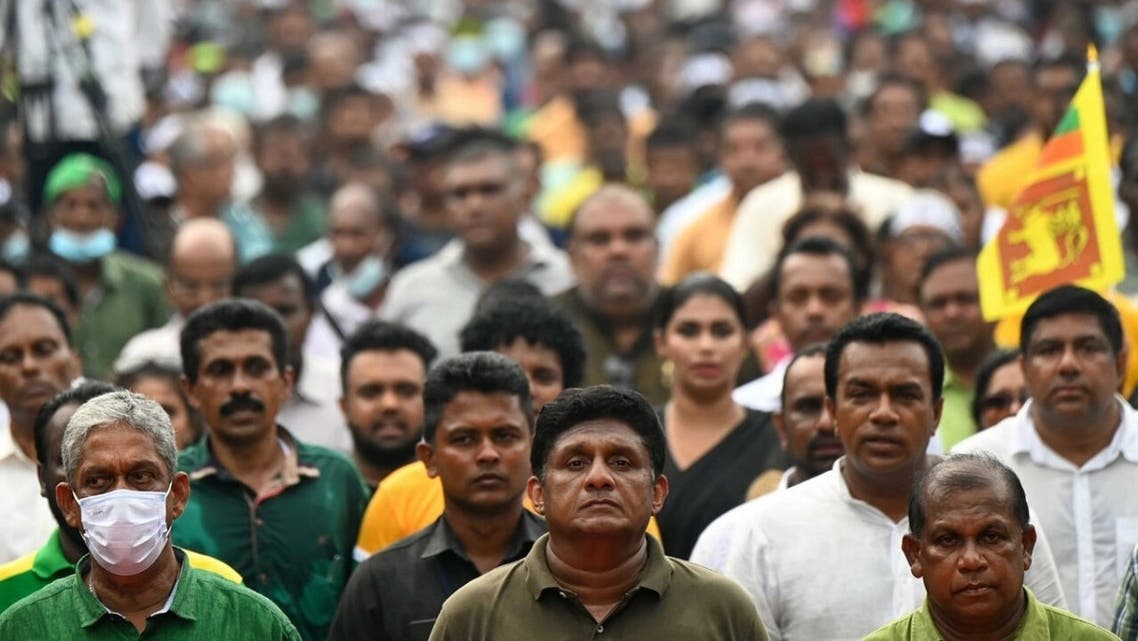May Day Rallies In Europe Urge More Help As Inflation Bites
By Associated Press
and Newsy Staff
May 1, 2022
Tens of thousands of people marched Sunday in cities around Europe for May Day protests to honor workers and shame governments into doing more for their citizens. In France, protesters shouted slogans against newly elected President Emmanuel Macron, a development that may set the tone for his second term.
Tensions erupted in Paris, as some demonstrators smashed windows at some banks, a fast-food restaurant and a real estate agency, apparently partially the work of masked men dressed in black. French police moved in, firing rounds of tear gas. That failed to stop a woman from attacking a firefighter trying to douse a street fire.
Interior Minister Gerald Darmanin said 45 people had been detained so far, including the young woman. Eight police officers were injured, he said, calling the perpetrators of the violence "thugs" who were trying "to stop the right to demonstrate."
May Day is often a time of high emotions for workers in Europe, and protests in the last two years have been limited by pandemic restrictions.
Turkish police moved in quickly in Istanbul to encircle protesters near the barred-off Taksim Square — where 34 people were killed In 1977 during a May Day event.
On Sunday, Turkish police detained 164 people for demonstrating without permits and resisting police at the square, the Istanbul governor's office said. On the Asian side of sprawling Istanbul, a May Day union-organized gathering drew thousands who sang, chanted and waved banners.
Berlin Mayor Franziska Giffey briefly interrupted her May Day speech at a trade union rally where someone threw an egg at her but missed. Giffey, of the center-left Social Democrats, was met by loud protests during her speech. Giffey called the egg tossing "neither helpful nor politically valuable."
In Italy, after a two-year pandemic lull, an outdoor mega-concert was being held in Rome after rallies and protests in cities across the country. Besides improving conditions for workers, peace was an underlying theme, with many calls for an end to Russia's war in Ukraine. Italy's three main labor unions held their main rally in the hilltop town of Assisi, a frequent destination for peace protests.
"It's a May Day of social and civil commitment for peace and labor," said the head of Italy's CISL union, Daniela Fumarola.
In Russia, a motorcade organized by the country's trade unions supportive of the invasion of Ukraine finished its cross-country trip in Moscow Sunday to mark May Day. Participating were 70 cars representing all Russian regions from Vladivostok to Astrakhan, as well as the Russia-backed separatist administrations controlling parts of Ukraine's Donetsk and Luhansk regions.
May Day celebrations in Russia also saw the arrests of antiwar protesters and bystanders across the country, including some who demonstrated in support of the authorities. According to reports by the Russian legal aid group OVD-Info, which tracks political arrests, a man was detained in Moscow after holding up a sign in support of the FSB and President Vladimir Putin.
Rising inflation and fears of upcoming food shortages from the war in Ukraine were feeding discontent around the world.
Thousands of workers, unemployed people and retirees marched peacefully in North Macedonia's capital of Skopje, demanding wage increases and respect for workers' rights. Inflation, running at an annual clip of 8.8% in March, is at a 14-year-high.
Darko Dimovski, head of the country's Federation of Trade Unions, told the crowd that workers are demanding an across-the-board wage increase.
"The economic crisis has eaten up workers salaries," he said.
In France, the May Day rallies — which came a week after the country's presidential election — aimed to show the centrist Macron the opposition that he could face in his second five-year term. Opposition parties, notably from the far-left and the far-right, are looking to break his government's majority in France's parliamentary election in June.
The Paris march was dominated by far-left leader Jean-Luc Melenchon, who placed third in the first round of the presidential vote and is deep in talks with other leftist parties in France, including the once-dominant Socialists who are struggling to exist. Melenchon appealed to potential partners to ally to keep Macron's centrists from dominating parliament as they do now.
"Our goal is victory," he said.
Some 250 marches and protests were being held around France. All were pressing Macron for policies that put people first and condemning his plan to raise France's retirement age from 62 to 65. Macron says that's the only way the government can continue to provide good retirement benefits.
"May Day is the time to rally for a reduction in working time. That reduction signifies one key thing — that workers should be getting a larger share of the wealth," Melenchon said, condemning the violence at the Paris march, which he said overshadows the concerns of workers.
In a first, French far-right leader Marine Le Pen was absent from her party's traditional wreath-laying at the foot of a statue of Joan of Arc, replaced by the interim president of her National Rally party. Le Pen was defeated by Macron in the April 24 presidential runoff, and plans to campaign to keep her seat as a lawmaker.
"I've come to tell the French that the voting isn't over. There is a third round, the legislative elections," said National Rally's Jordan Bardella. "It would be unbelievable to leave full power to Emmanuel Macron."
Additional reporting by The Associated Press.
Workers around the world mark May Day with rallies for better working conditions
By Emma Bowman
Published May 1, 2022
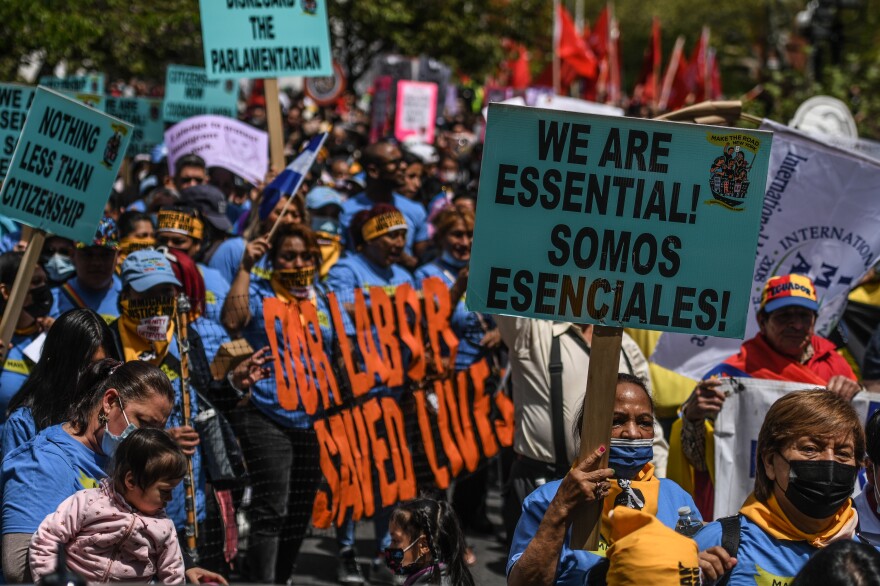
Stephanie Keith
Workers participate in a May Day rally in New York City. Amazon workers recently unionized a facility in Staten Island, emboldening other workers to push for their companies to unionize.
Demonstrators across the globe seized May Day, also known as International Workers' Day, as a moment to celebrate working-class contributions as they rallied for better labor rights, immigration overhauls, and other causes around social and economic equality.
New York City
Crowds of activists marched through lower Manhattan to demand worker protections and immigration overhauls on Sunday.
Local chapters of labor organizations affiliated with the AFL-CIO held a "United Against Union Busting" march and rally that kicked off at Union Square. Stopping points on the march's route included a Starbucks Roastery, a Whole Foods and a penthouse owned by Starbucks CEO Howard Schultz.
The event comes as workers at Starbucks and Amazon (which owns Whole Foods) drive a nationwide push to unionize. Those efforts that have been met with pushback from corporations working to break up the formation of unions.
Elsewhere, Rep. Alexandria Ocasio-Cortez, D-N.Y., spoke at a rally in Foley Square championing immigrant labor. She demanded a full path to citizenship for immigrants.
"We are fighting for workers because workers fight for us," she told a crowd.
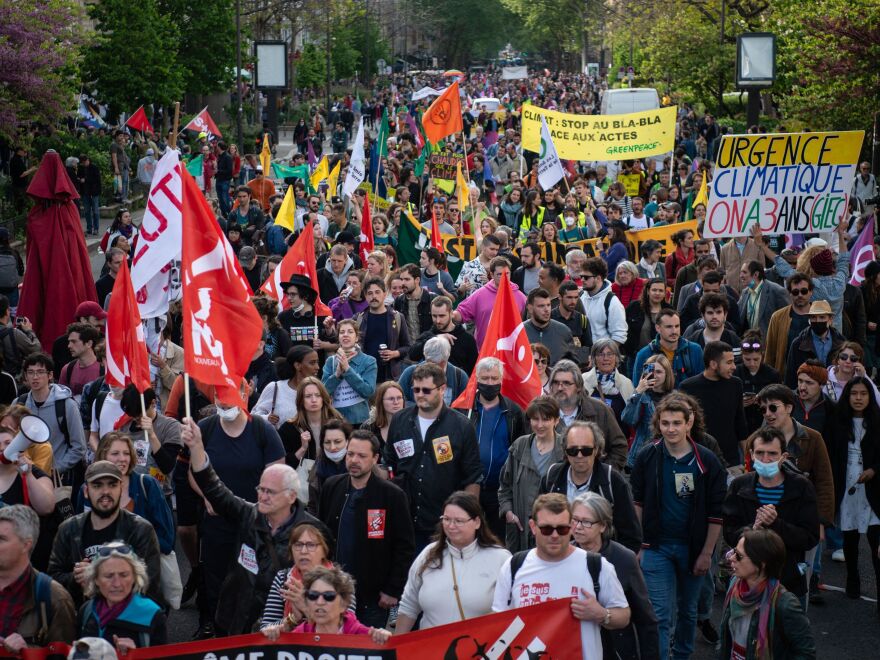
AFP Via Getty Images
In France, demonstrators staged more than 200 marches and protests across the country, with a focus on Paris.
Violence broke out in the city, as some people smashed windows at banks and ripped up street signs. Police moved in, firing rounds of tear gas, according to The Associated Press.
Far-left protesters used the day to exercise their opposition to newly reelected President Emmanuel Macron and his plan to raise France's retirement age from 62 to 65.
Turkey
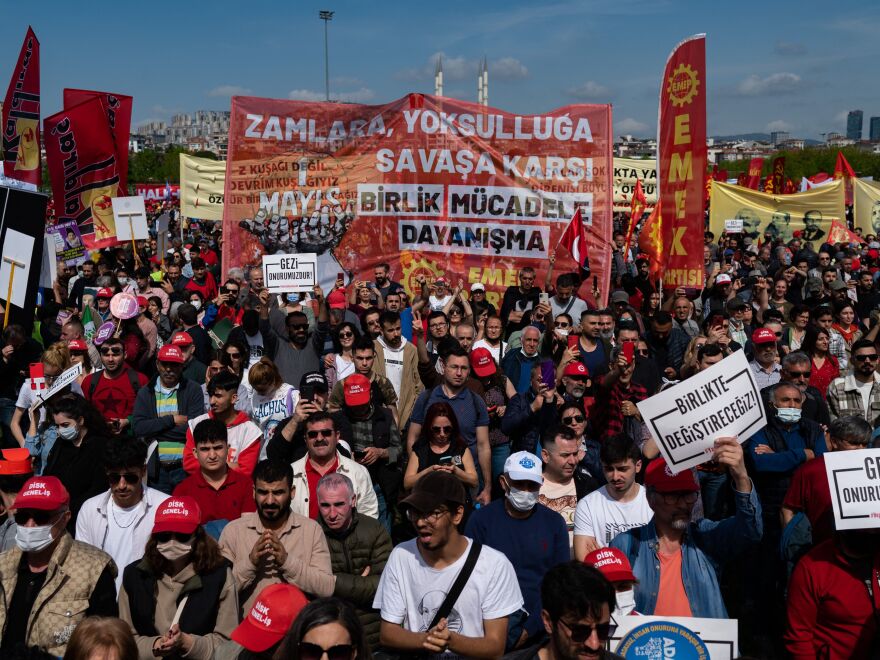
Yasin Akgul / AFP Via Getty Images
Demonstrators hold flags, banners and shout slogans during the annual May Day demonstration in the Maltepe district of Istanbul on Sunday.
In Istanbul on Sunday, Turkish police detained at least 164 people for demonstrating without permits and resisting police at Taksim Square, the AP reported, citing the city governor's office.
In what's known as the Asian side of Istanbul, thousands of May Day observers gathered in song, chants and banner-waving as part of a demonstration organized by the Confederation of Progressive Trade Unions of Turkey.
Taksim Square is a meaningful site to workers in Turkey, which in 2013 saw anti-government protests and in 1977 where an armed attack left dozens of labor protesters dead.
China
Chinese passed a normally busy national holiday weekend quietly this May Day. Many cities in China are currently under lockdown and travel is restricted due to the government's "zero-COVID" policy, which has prohibited millions of residents from leaving their homes. On Sunday, some restrictions eased in Shanghai, the country's largest city, but businesses remained closed and events canceled.
Cuba

Ismael Francisco / AP
Thousands file through an avenue during a May Day march to Revolution Square in Havana, Cuba, on Sunday.
In Cuba, people took to the streets with banners and pictures of Cuban revolutionary leaders. President Miguel Díaz-Canel and retired leader Raul Castro led a massive march in the capital of Havana.
Government-led May Day marches in Cuba celebrate the 63-year-old Cuban revolution and are meant to serve as a rebuke to the U.S. embargo, as Reuters notes.
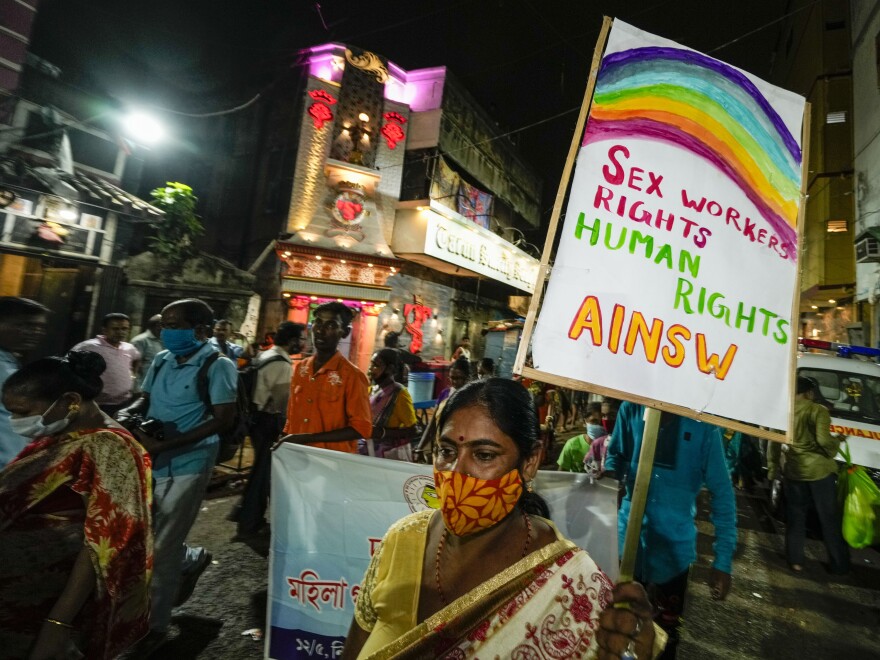
Bikas Das / AP
Sex workers and activists walk in a rally demanding right of work in government labor rules on the eve of May Day in Kolkata, India.
Sex workers in Kolkata's biggest red-light district, Sonagachi, marched on the eve of May Day as part of a rally held by a group working to decriminalize sex work and eliminate the profession's stigma.
"Our work is constitutional & our children need their mothers to have the status of a regular worker," Bishakha Laskar, president of the group known as the Durbar Mahila Samanwaya Committee, was quoted as saying according to the news agency ANI.
On Sunday, trade unions held rallies in multiple cities in India demanding better working conditions and more labor rights.
The Associated Press contributed to this report.
Copyright 2022 NPR. To see more, visit https://www.npr.org
People take part in a demonstration on the International Labor Day in Athens, Greece, on May 1, 2022. Thousands of Greeks took to the streets in central Athens and other big cities across the country on Sunday to mark the traditional Labor Day, asking for more relief measures amid the current energy crisis and high inflation due to the Russia-Ukraine conflict. [Photo/Xinhua]
Thousands of Greeks took to the streets in central Athens and other big cities across the country on Sunday to mark the traditional Labor Day, asking for more relief measures amid the current energy crisis and high inflation due to the Russia-Ukraine conflict.
"Democracy, justice, peace and equality," demonstrators chanted marching in front of the Greek parliament in the capital city while raising banners with similar slogans.
In a press release, ADEDY, the umbrella labor union of civil servants, said that workers protested against the wave of increases in energy, fuel, bread and food that has hit the country. "We demand increases in the salaries to live with dignity," they stated.
"Unemployment rates are high, the salary is not enough even for half month," Christos Katsikas, a demonstrator and also a professor in Athens, told Xinhua.
For Maria Patrikiou, a nurse in a public hospital, May Day still holds true today as every year. "Especially this year, with the crisis and the war, our rights have been challenged. That's why we came here to fight for our salaries, for our lives...," she added.
At the same time, Greek Prime Minister Kyriakos Mitsotakis released a statement on social media to coincide with the Labor Day.
"We welcome Worker's May 1 with the implementation of a meaningful measure for workers, namely the increase of Greece's minimum wage by 50 euros a month which equals an additional 15th wage every year," he stated.
Sunday's mobilization affected the public transport services. Metro lines in Athens operated with stoppages, flights were disrupted and ships remained docked at ports.
Portuguese PM announces better wages on Labor Day
Portuguese Prime Minister Antonio Costa on Sunday pledged to promote a "reinforcement of the share of wages in the country's gross domestic product (GDP)" to reach the European average.
The prime minister published a chart on his Twitter account comparing the share of wages in Portuguese GDP with the European average during the years 2016 and 2021, in which he led the country's government.
According to Costa, between 2022 and 2026, the weight of remuneration in GDP in Portugal will be increased to 20 percent, reaching the European average.
Labor Day is celebrated on Sunday throughout the Portuguese territory with various demonstrations promoted by the country's trade unions.
PAKISTAN
Labour Day observed in AJK
APP
MAY 2, 2022
In Azad Jammu & Kashmir (AJK), the World Labor Day was observed on Sunday to pay rich tributes to those workers and laborers who laid down their lives for the achievement of their rights this day 136 years ago this day in ancient Chicago city of the United States of America. The laborers across the world observe May 1st to commemorate the supreme sacrifices of the laborers who laid down their lives this day in 1886 while struggling for the achievement of the rights of their colleagues in Chicago – besides to pay tributes to them.
Special May Day simple but impressive ceremonies coupled with processions, were staged in all the ten districts of AJK including in Mirpur, capital city of Muzaffarabad, Neelam valley, Kotli, Bagh, Rawalakot, Sudhanoti, Hattiyan, Havaili and Bhimbher districts to observe the day. Various organizations of workers and laborers of different private and public sector institutions held special ceremonies to observe the day in a befitting manner to commemorate the supreme sacrifices of lives of the laborers in Chicago this day 136 years ago.
In Mirpur, a May day procession of labourers, working class converged into rally at Kashmir Press auditorium under the auspices of the J & K Workers Party, Labour wing of the Jammu & Kashmir Peoples National Alliance, PWD Workers Union, Jammu & Kashmir Workers Party, Jammu Kashmir Plebiscite Front and other Kashmiri political human rights and labor organizations.
Led by the Jammu Kashmir Peoples National Aalliance Chairman Raja Zulfiqar Ahmed Advocate, and other Labour leaders, the procession passed through Mian Muhammad Road, Shaheed Chowk and Allama Iqbal Road and turned into congregation at the Mumtaz Banquet Hall at Sajid Plaza at the city center. The participants of the rally raised slogans against the increased price hike and inflation in the country including AJK.
Addressing the rally speakers including the J & K PNP Chaiman Zulfiqar Ahmed Raja Advocate, Azeem Dutt Advocate of Jammu Kashmir Plebiscite Front, Aslam Watnoof, Ch. Yousaf Advocate, Ehteshaam ul Haq Advocate and others vowed to continue the mission of the martyrs of Chicago to secure and safeguard due rights, dignity and honour of laborers. Speakers highlighted the importance of this historic universal day – besides paying rich tributes to the martyrs of Chicago.
Speakers reiterated their firm resolve to continue the struggle for freedom of Jammu & Kashmir with full vigor till it reach to its logical end. Speaking on this occasion, JK PNA Chairman Zulfiqar Ahmed Raja Advocate said that best way to pay glorious tributes to the martyrs of Chicago was to follow their foot steps for procuring and safeguarding the due rights of the working class – most particularly the laborers.
BRAZIL
Bolsonaro, Lula hold rival rallies on May
Day
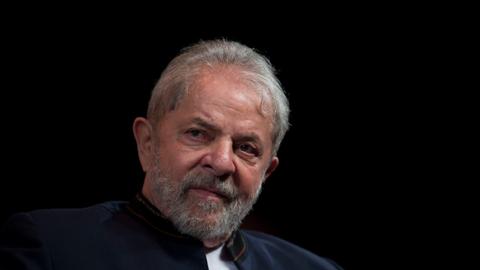
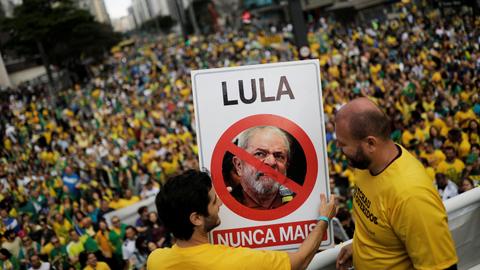
Brazil's right-wing President Jair Bolsonaro and ex-president Luiz Inacio Lula da Silva stage competing rallies that are expected to become previews of their campaigns for presidential elections
Brazilian right-wing President Jair Bolsonaro and his main rival, former leftist President Luiz Inacio Lula da Silva, have staged competing rallies that were expected to become previews of their campaigns for presidential elections in October.
Supporters of Bolsonaro had called during the week protests against the Supreme Court, after he pardoned a congressman sentenced to eight years in prison for threatening judges.
The pardoned congressman, Daniel Silveira, said in a rally on Sunday in Niteroi, in Rio de Janeiro state, that his arrest last year was "unconstitutional."
Silveira thanked fellow congressmen that helped him during his months in prison last year. He was freed in November, but the Supreme Court last month sentenced him to more than eight years of jail. Bolsonaro decided to pardon him.
Bolsonaro went to a rally protesting against the Supreme Court in Brasilia on Sunday. In a video stream from one of his social media accounts, Bolsonaro said the demonstrations were "pacific, to defend the constitution, democracy and freedom."
In Sao Paulo, there were simultaneous demonstrations to support the president and Lula.
READ MORE: Brazil's Supreme Court confirms decision to annul Lula convictions
Lula promises respect for workers
In a 15-minute speech, Lula promised to supporters, including many union leaders, that he would "resume negotiations to get workers rights respected again" if elected.
Lula said he was speaking before becoming an official candidate, with the announcement expected for May 7.
The former president cited the recent UN human rights committee finding that Brazil graft investigators violated due process in bringing a case against Lula that led to his imprisonment and barred him from running for office in 2018.
The competing rallies reflect the deep political divisions in the country, and indicate the upcoming elections later this year will be hard fought, and could cause a political crisis if either side rejects the final results.
READ MORE: Brazilian court voids convictions against former president Lula da Silva


